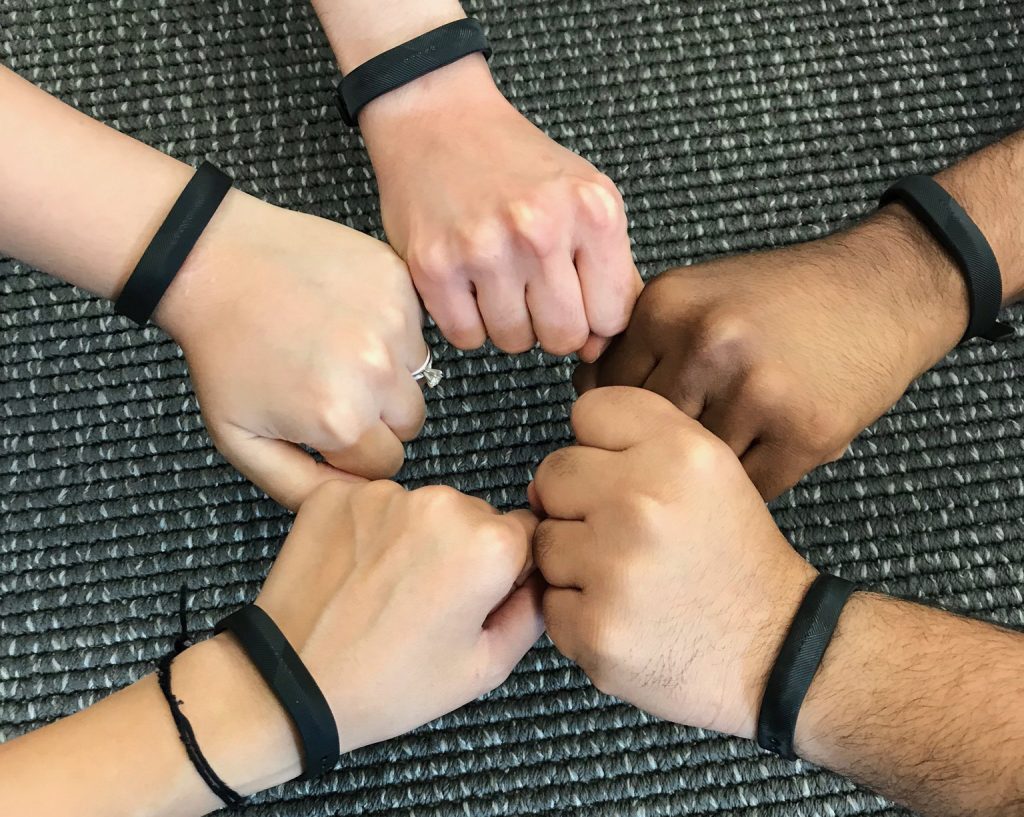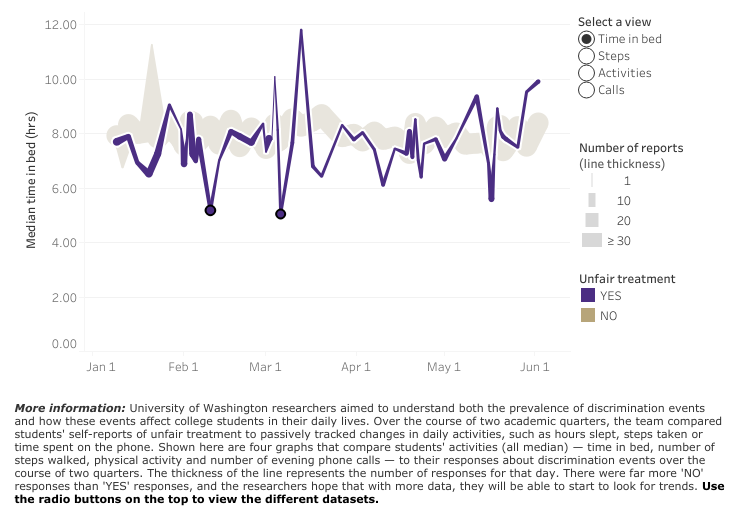
As part of the UW EXP Study led by professor Jennifer Mankoff in the Allen School’s Make4all Lab, a team of researchers set out to measure how specific incidents of discrimination can affect people’s behavior in the short-term by analyzing the experiences of college students at the University of Washington with the help of mobile and wearable devices.
In a paper presented last week at the Association for Computing Machinery’s 22nd Conference on Computer-Supported Cooperative Work and Social Computing (CSCW 2019) in Austin, Texas, Mankoff and her collaborators analyzed the prevalence of discriminatory events and their association with behaviors among UW freshmen over two academic quarters in 2018. Working with 209 student volunteers — 176 of whom completed the study — the team sought to quantify each separate experience of discrimination to learn more about the immediate reactions. The study used passive sensing data collected via Fitbit Flex 2 wearable devices that tracked participants’ daily activities like sleep and movement and AWARE, an app installed on their smartphones that tracked their location, when and how often their phone screens were unlocked, and the length of their calls. The sensing data was correlated with the results of periodic surveys in which the students self-reported instances of unfair treatment. The researchers aimed to engage female students in STEM-related fields, where gender discrimination is an ongoing problem, as well as minorities and first-generation students in engineering.

By the end of the study, participants had reported experiencing a total of 448 discriminatory events. The researchers found that, on average, those that reported being discriminated against were more physically active, interacted with their phones more, and slept less on the day of the event.
“It’s so hard to summarize the impact of something like this in a few statistics,” Mankoff said in a UW News release. “Some people move more, sleep more or talk on the phone more, while some people do less. Maybe one student is reacting by playing games all day and another student put down their phone and went to hang out with a friend. It’s giving us a lot of questions to follow up on.”
Mankoff said the survey didn’t capture all discrimination events, but was instead a snapshot of some of the students’ experiences. More than half of them reported undergoing at least one discrimination event; many of those experienced about five events during the six month study period. In addition to the data on sleep, physical activity, and communication, the team found that discrimination events were associated with increased depression and loneliness — though the impact appeared to be less among those who could count on better social support.
“We looked at objective measures of behavior to try to really understand how this experience changed students’ daily life,” explained Allen School Ph.D. student Yasaman Sefidgar, lead author of the paper. “The ultimate goal is to use this information to develop changes that we can make both in terms of the educational structure and individual support systems for students to help them succeed both during and after their time in college.”

The researchers hope that, by possessing a better understanding of the consequences of discrimination, this work will lead to more supportive policies focused on prevention, intervention, and student retention in higher education.
“These students are not just giving us data, which sounds like some abstract, unemotional term,” Mankoff said. “They are sharing deeply personal information with us. It’s very important to me that we honor that gift by finding ways to help that don’t place the responsibility to deal with discrimination all on the individual.”
In addition to Mankoff and Sefidgar, co-authors on the paper include Allen School Professor Tim Althoff; UW Information School Dean Anind Dey; Eve Riskin, associate dean of diversity and access for the UW College of Engineering; Paula Nurius, professor of the UW School of Social Work; Anne Browning, founding director of the UW Resilience Lab; Kevin Kuehn, a clinical psychology doctoral student at the UW; and University of Michigan doctoral student Woo Suk Seo.
To learn more, read the full publication, “Passively-sensed behavioral correlates of discrimination events in college students,” the related UW News release, and coverage by Inside Higher Ed and The College Post.
The University of Washington values and honors diverse experiences and perspectives, strives to create welcoming and respectful environments and promotes access and opportunity. Students, faculty and staff that encounter or suspect incidents of bias are encouraged to report it.

